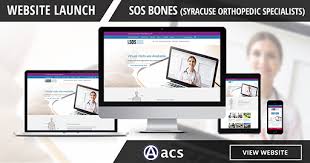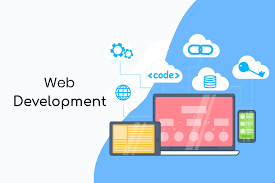The Importance of Website Development and SEO
Website development and SEO (Search Engine Optimization) go hand in hand when it comes to creating a successful online presence. A well-designed website is crucial for attracting visitors, while effective SEO strategies help drive organic traffic to your site.
Website Development
Website development involves designing, building, and maintaining a website. A professional-looking website that is user-friendly and responsive across all devices is essential for engaging visitors and encouraging them to explore your content. It is important to create a visually appealing layout, easy navigation, and fast loading speeds to provide a positive user experience.
SEO
SEO is the process of optimizing your website to rank higher in search engine results pages. By incorporating relevant keywords, meta tags, alt text, and high-quality content, you can improve your site’s visibility and attract more organic traffic. Off-page SEO techniques such as link building also play a crucial role in boosting your site’s authority and credibility.
The Connection Between Website Development and SEO
Effective website development complements SEO efforts by creating a solid foundation for search engine optimization. A well-structured website with clean code, fast loading times, mobile responsiveness, and intuitive navigation enhances the user experience and encourages visitors to stay longer on your site. This can reduce bounce rates and improve overall engagement metrics that search engines consider when ranking websites.
Additionally, implementing SEO best practices during the website development process ensures that your site is optimized for search engines from the start. By focusing on technical aspects such as URL structure, meta tags, image optimization, and internal linking, you can improve your site’s chances of ranking higher in search results.
In Conclusion
Website development and SEO are essential components of a successful online strategy. By investing in a well-designed website that incorporates SEO best practices, you can attract more visitors, increase conversions, and ultimately grow your online presence. Remember that continuous monitoring, testing, and optimization are key to staying ahead in the ever-evolving digital landscape.
9 Essential Tips for Effective Website Development and SEO Success
- Ensure your website is mobile-friendly to reach a broader audience.
- Use clean and organized code to improve site performance and SEO.
- Optimize images for faster loading times without compromising quality.
- Incorporate relevant keywords naturally into your content for better search engine ranking.
- Create high-quality, engaging content that provides value to your visitors.
- Utilize meta tags effectively, including title tags and meta descriptions, for improved SEO.
- Implement a secure HTTPS connection to build trust with users and boost rankings.
- Regularly update your website with fresh content to keep it relevant and improve SEO.
- Use internal linking to help search engines understand the structure of your site and improve navigation for users.
Ensure your website is mobile-friendly to reach a broader audience.
Ensuring that your website is mobile-friendly is a crucial tip in website development and SEO. With the increasing use of mobile devices, having a responsive design that adapts to different screen sizes is essential to reach a broader audience. A mobile-friendly website not only provides a better user experience but also improves your site’s SEO performance, as search engines prioritize mobile-optimized sites in their rankings. By catering to mobile users, you can expand your reach, increase engagement, and ultimately drive more traffic to your website.
Use clean and organized code to improve site performance and SEO.
Using clean and organized code is a crucial tip in website development that not only enhances site performance but also boosts SEO. By maintaining a tidy code structure, developers can ensure faster loading times, smoother user experiences, and improved search engine rankings. Clean code reduces the chances of errors or bugs, making it easier for search engine crawlers to index and understand your website content. Additionally, organized code allows for easier updates and modifications, ultimately contributing to a more efficient and effective online presence.
Optimize images for faster loading times without compromising quality.
Optimizing images for faster loading times without compromising quality is a crucial tip in website development and SEO. By reducing the file size of images through compression techniques and choosing the appropriate file format, you can improve your site’s loading speed, which is a key factor in user experience and search engine rankings. Ensuring that images are properly optimized not only enhances the overall performance of your website but also contributes to better SEO results by reducing page load times and increasing user engagement.
Incorporate relevant keywords naturally into your content for better search engine ranking.
Incorporating relevant keywords naturally into your content is a crucial tip for improving search engine ranking. By seamlessly integrating targeted keywords into your website content, you can enhance its visibility and relevance to search engines. This practice not only helps attract organic traffic but also signals to search engines what your website is about, increasing the likelihood of ranking higher in search results. Remember to prioritize user experience by ensuring that the keywords flow naturally within the context of your content, ultimately leading to a more engaging and informative website for visitors.
Create high-quality, engaging content that provides value to your visitors.
Creating high-quality, engaging content that provides value to your visitors is a crucial tip for successful website development and SEO. By offering informative and relevant content that resonates with your target audience, you can attract and retain visitors, encourage them to explore your site further, and ultimately improve your search engine rankings. Quality content not only enhances the user experience but also establishes your credibility and authority in your industry, leading to increased organic traffic and better engagement metrics. Remember, content is king when it comes to building a strong online presence and driving success in the digital landscape.
Utilize meta tags effectively, including title tags and meta descriptions, for improved SEO.
Utilizing meta tags effectively, such as title tags and meta descriptions, is a crucial tip in website development for improving SEO. Title tags provide search engines with a clear understanding of the content on each page, helping to boost visibility in search results. Meta descriptions, on the other hand, serve as a brief summary that entices users to click through to your site. By optimizing these meta tags with relevant keywords and compelling information, you can enhance your site’s search engine rankings and attract more organic traffic.
Implement a secure HTTPS connection to build trust with users and boost rankings.
Implementing a secure HTTPS connection is a crucial step in website development and SEO. By ensuring that your website is encrypted and secure, you not only build trust with users who value their privacy and security but also signal to search engines that your site is trustworthy and credible. This can lead to higher rankings in search results, as search engines prioritize secure websites in their algorithms. By prioritizing HTTPS, you not only protect sensitive information exchanged between your site and users but also enhance your online visibility and reputation.
Regularly update your website with fresh content to keep it relevant and improve SEO.
Regularly updating your website with fresh content is a crucial tip for successful website development and SEO. By consistently adding new and relevant content, you not only keep your site engaging for visitors but also signal to search engines that your website is active and up-to-date. Fresh content can help improve your site’s SEO by targeting new keywords, attracting more organic traffic, and increasing your site’s authority in search engine rankings. By prioritizing regular updates, you can stay ahead of the competition, drive more traffic to your site, and ultimately enhance your online visibility and success.
Use internal linking to help search engines understand the structure of your site and improve navigation for users.
Utilizing internal linking on your website is a valuable strategy for enhancing both SEO and user experience. By incorporating relevant internal links throughout your content, you not only assist search engines in comprehending the architecture of your site but also provide users with easy access to related information. Internal linking helps establish relationships between different pages on your website, guiding visitors to explore additional content and improving overall navigation. This practice can contribute to higher search engine rankings, increased organic traffic, and enhanced engagement metrics, making it a crucial aspect of effective website development and SEO strategies.




